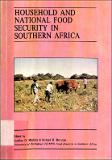| dc.contributor.author | Rukuni, Mandivamba | |
| dc.coverage.spatial | Southern Africa. | en |
| dc.date.accessioned | 2016-02-03T11:26:29Z | |
| dc.date.available | 2016-02-03T11:26:29Z | |
| dc.date.issued | 1989 | |
| dc.identifier.citation | Rukuni, M. (1989) Irrigation research priorities for Southern Africa. In: Mudimu, G.D. and Bernsten, R.H. (eds.) Household and national food security in Southern Africa, pp. 359-369. Harare: DAEE. | en |
| dc.identifier.uri | https://opendocs.ids.ac.uk/opendocs/handle/20.500.12413/8871 | |
| dc.description | A research paper advocating for more research on irrigation -based agriculture in the SADCC region of Africa as a way of mitigating against food insecurity in that region. Originally presented at presented at The Fourth Annual Conference on Food Security In Southern Africa, 31 October- 3 November, 1988. | en |
| dc.description.abstract | Irrigation is a major force in world agricultural development. For instance, 20% of the world’s agricultural land is irrigated and it produces 40% of the world’s agricultural output (Kouda, 1977). India, China, Mexico, Sudan, Egypt, and many other countries are using irrigation as the engine of agricultural production and production stability. The World Bank, the Food and Agriculture Organization (FAO), and many other international organisations regard irrigation as an important means of increasing food and agricultural production. But so far, SADCC states have been slow in developing irrigation. For example, Southern Africa has an estimated 2% of its cropped land under irrigation-compared with 5% in Sub- Saharan Africa and 35% in India. SADCC’s Food Security Programme has launched Project Number 12 to improve irrigation management and development in the region; but the knowledge base on the technical, social, economic, and environmental issues surrounding irrigation in Southern Africa is woefully inadequate. For each type of system, Project 12 needs updated records of areas, crops grown, yields, and irrigation potential.
This paper primarily calls for expanded applied research on irrigation and food security in the SADCC region. If irrigation is to play an increasing role in family and national food security, then research has to indicate what needs to be done to facilitate cost-effective irrigation development. | en |
| dc.language.iso | en | en |
| dc.publisher | University of Zimbabwe (UZ) Publications/ Michigan State University (MSU) | en |
| dc.rights.uri | http://creativecommons.org/licenses/by-nc-nd/3.0/ | en |
| dc.subject | Agriculture | en |
| dc.subject | Economic Development | en |
| dc.title | Irrigation research priorities for Southern Africa | en |
| dc.type | Book chapter | en |
| dc.rights.holder | University of Zimbabwe (UZ)/ Michigan State University (MSU) | en |


